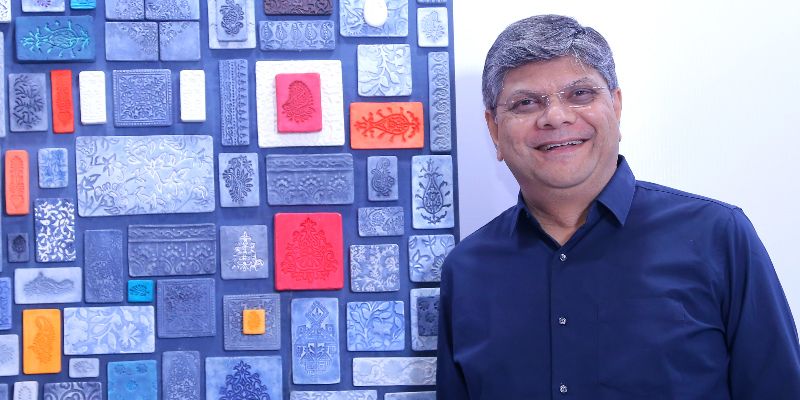How Ahmedabad-based Arvind Ltd is solving the water crisis in India, one pair of jeans at a time
Listed denim fabric giant Arvind Ltd is creating sustainable, 'green jeans' in order to reduce use of water and other resources, thus elevating the water crisis in India.
The numbers you may usually associate with Arvind Limited are its number one market standing when it comes to manufacturing and exporting denims from India, or perhaps its steadily climbing annual revenue - a whopping Rs 5,407.26 crore as of last year.
Significantly more impressive, and surprisingly more refreshing, however, coming from a Goliath are the following numbers: 60 percent of the 140 million metres of denim fabric and 7.2 million denim garments were manufactured sustainably, with the 70 litres of water taken to wash each garment bing sewage-treated water, and not groundwater, and 50 percent of the water used organisation-wide being recycled water.
Here is the story of how Arvind Ltd has been using its Green Denims initiative to mitigate India’s water crisis.

A history
Arvind is an industry leader in the area of sustainable denim, given its legacy of responsible stewardship, and the fact that environmental, social and economic sustainability are now major pillars of its business model. “Sustainability is the need of the hour. Brands as well as consumers today are becoming increasingly environmentally conscious and realising the importance of recycling. Being one of the world’s largest producers of denim, we knew we also had to embed green thinking within our manufacturing philosophy,” says Aamir Akhtar, CEO, Denims, Arvind Ltd.
Technology has played an important role in the road to complete sustainability. Aamir claims the company's sustainable DNA is what sets it apart – because it permeates every process in the fabric and garment manufacturing, across the fibres and dye chemicals it uses, through its process engineering, disruptive production technologies, water stewardship and relentless championing of renewable energy.
A few demonstrable cases include
Gaston Foam Dyeing Technology: In collaboration with Gaston Technologies and Indigo Mill Designs of the US, Arvind has co-developed and invested in a new dyeing technology that disrupts the way Indigo dyeing has been done for the past 150 years. Once installed, this technology is expected to reduce water consumption by almost 90 percent, compared with traditional rope or sheet dyeing technologies.
Zero Liquid Discharge: ZLD technology is implemented at Arvind Denim’s effluent treatment plant (ETP), with a capacity to treat 17,500 million litres per day (MLD) of textile eluent. The effluent is fully recycled, and used in the process to replace the use of freshwater.
And, finally, Arvind’s ‘Zero Denim’: Cultivation of one kilo of cotton, which consumes approximately 20,000 litres of water. “Our expertise in the fibre blending and handling of a wide array of sustainable and non-cotton fibres such as linen, tencel, modal, biodegradable polyester, kapok etc, has enabled us to deliver 100 percent non-cotton-based denims, as well as 100 percent recycled denims,” Aamir explains.
Today, of the 140 million metres of denim fabric and 7.2 million denim garments Arvind manufactures every year, approximately 60 percent has either sustainable fibre content and/or a sustainable process involved. Its garment laundry, which consumes approximately 70 litres of water per garment wash, uses only sewage-treated water sourced from the municipality and draws no groundwater. In fact, 50 percent of the water used organisation-wide is recycled water.
When it comes to the company’s average raw water consumption – it was reigned in by 15 percent over the past two years, from 35 litres per metre to 29 litres per metre. And its average ETP inlet volume has reduced by 24 percent since the past three years, from 28 litres per metre to 21 litres per metre.
Aamir notes that the manufacturing process is solar-powered, and utilises roughly three MW of solar energy.
Challenges and milestones
Aamir states that for the R&D that goes towards the development of a viable supply chain for sustainable materials, they need to plough in substantial capex and opex, which can be challenging at times. From the brand perspective, availability of more comprehensive quality standards, tailormade for sustainable denims, and the brand’s acceptance of reasonable up-charge towards higher cost could help.
Organic, BCI cotton cultivation, founder membership of Sustainable Apparel Coalition, Zero Discharge Hazardous Chemicals (ZDHC) certification, installation of Zero Liquid Discharge (ZLD) unit, installation of neo dyeing, ikat dyeing technologies etc, are some of the milestones crossed so far. The next big milestone will be the installation of the Gaston Foam Dyeing technology by mid-November 2018.
“Rigorous R&D and mass adoption of such technologies and initiatives will bring about economies of scale, and build parity in cost with normal products. Arvind is consciously working on reducing the cost of its sustainable portfolio to expand usage,” Aamir notes.
The company has come to reap the reward of customer loyalty from brands that value sustainability. Patagonia, one of the most reputed global brands that champions sustainable fashion, sources almost its entire denim requirements from Arvind. Global brands and retailers such as Levi’s, C&A, Gap, H&M, Inditex, VF Corp and Target have clearly laid out their sustainability content agendas, and they closely collaborate with Arvind to build such initiatives. Of late, their customer-brands like Pepe, Benetton, US Polo, Flying Machine, Louis Philippe etc, have also taken a very keen interest in building a sustainable product portfolio.
However, Aamir insists that the company is committed to this initiative irrespective of market opportunities, because the need for sustainability is urgent, and needs to be assessed beyond its business cases, and how much “economic sense” it makes. “We are one of the first and few global denim companies who have clearly laid out a detailed manifesto of sustainability initiatives and are publishing an annual report of the progress made on all such initiatives,” he adds.
In fact, they are so confident of their processes that the company even publishes how it fares on the Higg Index – an apparel industry self-assessment standard for assessing environmental and social sustainability throughout the supply chain.
“This is a journey of continuous improvement and reduction in impact. There is a broad canvas of opportunities across fibres, dye chemicals, process re-engineering, and collaboration with technology partners, water stewardship and renewable energy. We are also scoping opportunities around social and economic sustainability through innovations such as khadi denim, which is manufactured by artisans in villages both inside and outside of industrial setups,” Aamir concludes.







